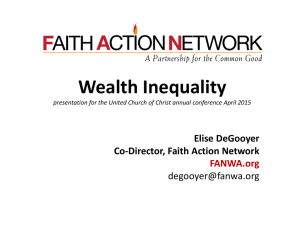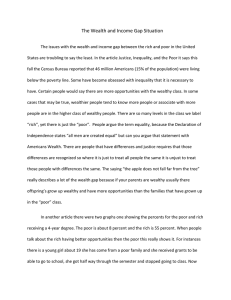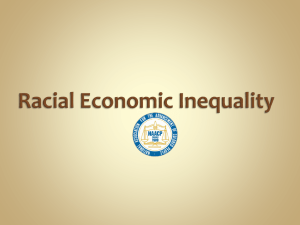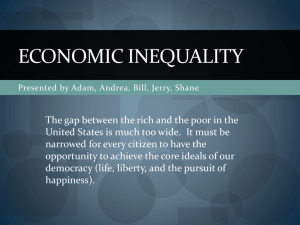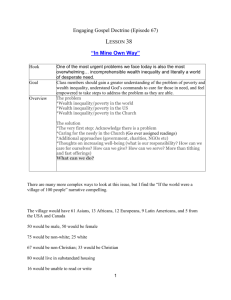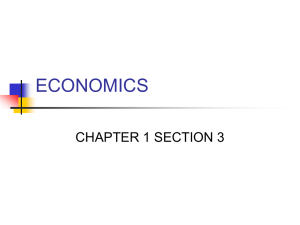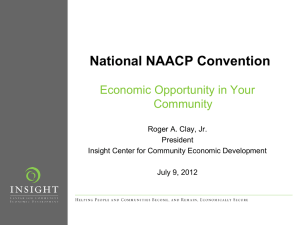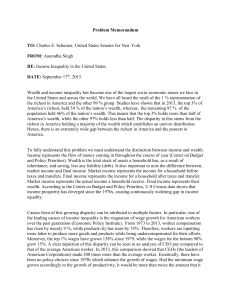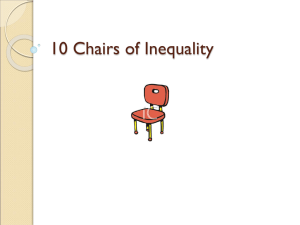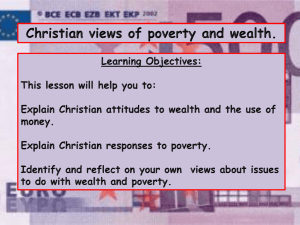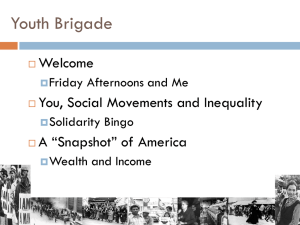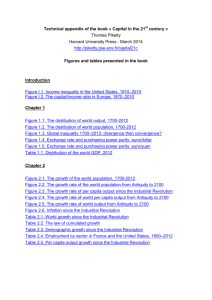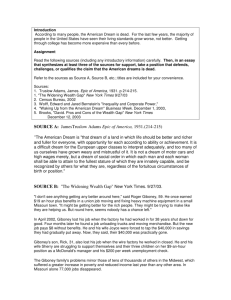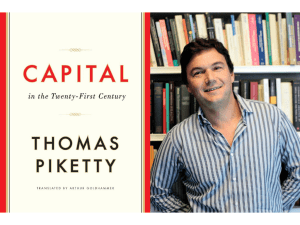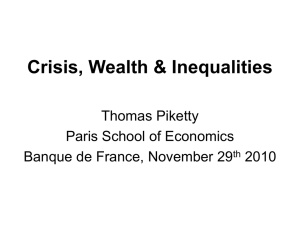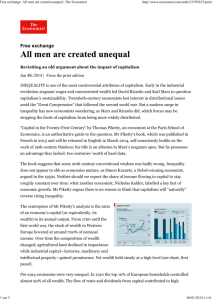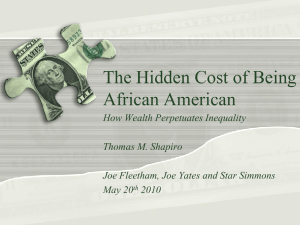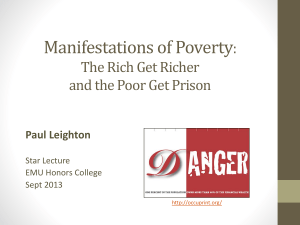4. Finance: Critical acupuncture point 3. How we
advertisement
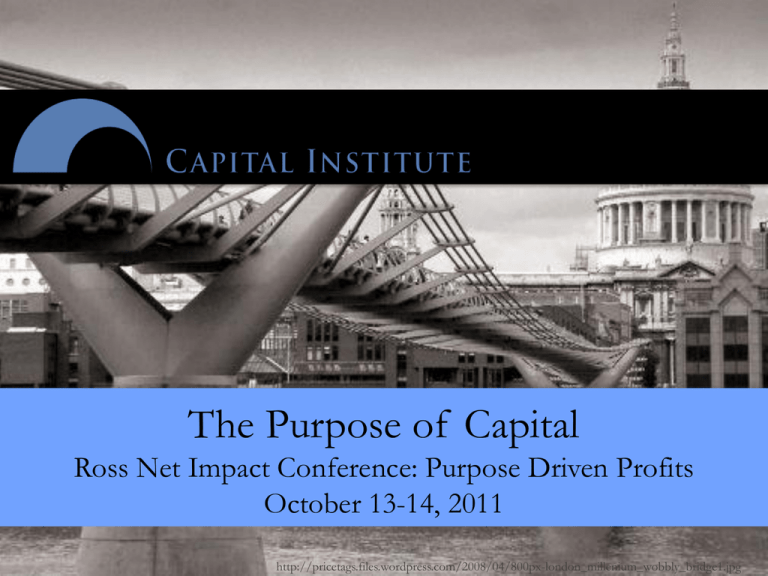
The Purpose of Capital Ross Net Impact Conference: Purpose Driven Profits October 13-14, 2011 http://pricetags.files.wordpress.com/2008/04/800px-london_millenium_wobbly_bridge1.jpg Understanding system transformation Capital Institute is about paradigm shifting. CHANGE consciousness system As derived from Dr. Monica Sharma’s work at the UN problems Agenda: “Think Different” 1. Competing world views 2. Our UNSUSTAINABLE economic system 3. How we got here 4. Finance: Critical acupuncture point 5. Regenerative Investment: Grasslands, LLC 1. Competing world views After 500 years of progress based on the Cartesian logic of the Enlightenment… this is our Copernican moment Reductionist Holistic Western View Systems View - Economy exists apart from nature and society as monetary phenomenon - Web of life: one system with multiple subsystems (holons); hierarchy of wholes is critical - Progress: Perpetual material improvement - Phase transitions, emergence - “Invisible hand” analogous to natural law that delivers most efficient outcome among relative scarcities - Adheres to laws of thermodynamics which implies absolute limits - “Externalities” are fixable market failures requiring government intervention - No such thing as “externalities” Society needs to define a “SOS” - Supremacy of the individual - Interdependence – all is connected - Machine as model – mechanistic/linear - Nature as model – complexity/emergence 2. Our UNSUSTAINABLE economic system OVERSHOOT The global economy now uses up 1.5 times the earth’s capacity to regenerate the natural capital upon which the system and life depends. - The Global Footprint Network “Safe Operating Space” -- The world is full “Safe Operating Space” - National Center for Ecological Analysis and Synthesis UNCERTAINTY SPIKE Symptoms of an unsustainable system overwhelm our senses with crisis upon crisis 2b. rising inequality is UNSUSTAINABLE Wealth Gap vs. Wellbeing Worse USA Wealth Disparity: •2% of population Controls > ½ the World’s Wealth •50% of population controls < 1% of World’s Wealth •Income gaps between rich and poor > 2X in last 50 years Portugal UK Wellbeing Greece Ireland New Zealand Symptom: Increasing Wealth Inequality Austria Denmark Belgium Finland France Australia Canada Germany Italy Spain Switzerland Netherlands Norway Sweden Japan Better Low v v Wealth Gap http://www.inhabitat.com/2010/10/14/worlds-largest-and-most-expensive-family-home-completed/ Wilkinson & Pickett, The Spirit Level (2009) High Capitalism and democracy demand trust Inequality lead to the Financial Crisis Paul Krugman: “Inequality and Crisis: Coincidence or Causation?” 3. How we got here Our economy has become an anti-economy, a financial system without a sound economic basis and without economic virtues. - Wendell Berry Desired Outcome EconomicWhat’s Efficiency wrong with this picture? Finance Economy Planet The most important chart in the world… Sustainability in Natural Systems Optimum Sustainability 100% Collapse of Financial System 0% Resilience Efficiency Source: Lietaer, Ulanowicz, Goerner 2008 4. Finance: Critical acupuncture point What are the “First Principles” of sustainable economics? • Bruntland Report, 1987: “Sustainable Development” • Dematerialization through efficiency - Jevon’s Paradox • Weak vs Strong sustainability “First Principles” of sustainable finance: What’s your impact? • Relative scarcity vs absolute scarcity • Real vs virtual wealth: the exponential function • Finance practice: what is “value”? Regenerative SRI/ESG Unsustainable Green Restorative Sustainable Resiliency: Driving financial capital upstream http://3.bp.blogspot.com/_o0s746IzxZQ/TJwMEtnPvsI/AAAAAAAAAWo/lX-2ewPZzo/s1600/upstream.jpg Regenerative Investing: Grasslands, LLC A Holistic Management Enterprise in Partnership with Savory Institute • • • • Alan Savory won the Buckminser Fuller Award in 2010 Ranch management contracts, owned and third party 55,000 acres under management in S. Dakota and Montana Expansion in Great Plains, New Zealand, Patagonia The World’s Grasslands are Vast • 12.5 billion acres — (~40% of total landmass) • ~1 Billion people, many poor, make their living as pastoralists Peak Soil? •Soil is second largest carbon sink after the oceans •According to James Hansen, the atmosphere contains 800Gt of carbon, plants 600Gt, and soils contain 1500Gt •We’re losing about 24 B tons of soil per year Nature Provides the Solution Impact Investment: What we feed, GROWS Wyoming – both photos taken same day • Left-side upstream, managed holistically (260% inc in livestock over 10 years) • Right-side is downstream land managed ‘conventionally’ Sign up for Our Newsletter Join the Conversation Thank you!
